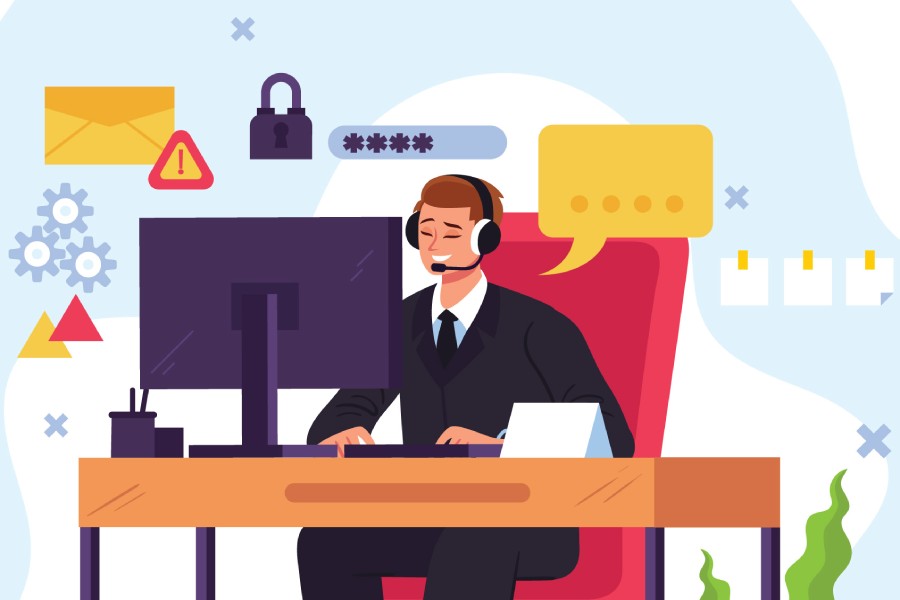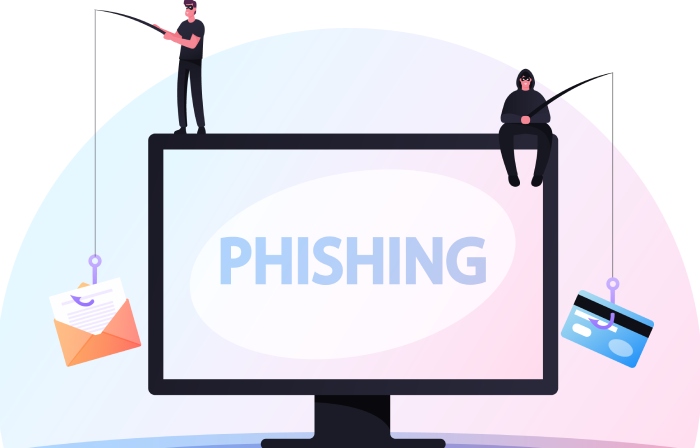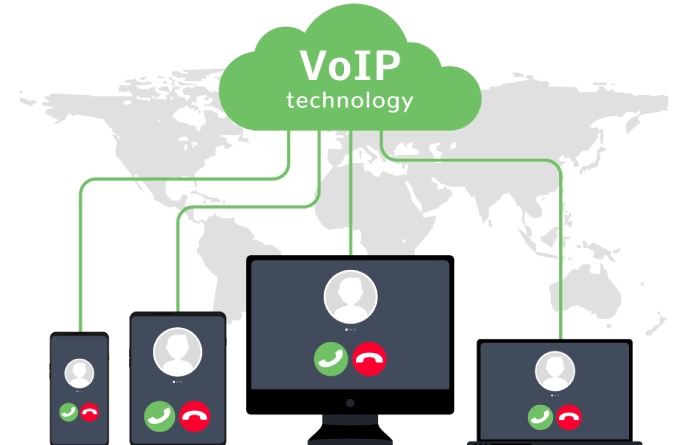Modern technology has left businesses vulnerable to targeted attacks by malicious hackers and spyware. It’s fairly common for businesses to experience cyberattacks at some point, as hackers try to gain access to confidential information. There are numerous intentions behind targeted attacks, with the primary one being information or data theft.
According to a Statista report, the tail end of 2022 saw around 15 million data records being exposed through targeted data breaches, a 37% increase from earlier in the year. These figures are alarming on their own, but place them in the larger context and the situation looks absolutely grim. Data breaches can cost thousands if not millions of people their jobs, compromise employee and stakeholder safety, and even cause businesses to shut down.
What is Vishing?
Vishing is also called VoIP phishing and is a serious cyberattack in which hackers use audio communication to breach data and information.
The usual goal behind a malicious vishing attack is to gain access to financial information and profit off of it. There is a variety of cybercrime attacks that criminals use to gain this sort of access, namely phishing, vishing and smishing. The intent behind these attacks stays the same. The only factor that changes is the way the attacks are executed. This is where vishing comes in.
Think about ordinary VoIP channels, such as a hosted VoIP system. Any medium that allows phone calls can leave a business open to a vishing attack, possibly causing irreparable damage.
There are a number of different strategies that hackers can use when they’re trying to infiltrate a business. Some cybercriminals use threats, coercion, and blackmail to get sensitive information from their victims, while others lay out elaborate scams and use deception to get the data they need. Voice phishing criminals can pretend to be office staff, concerned friends, or even kind strangers to get data through vishing.
A Quick Look at Vishing Scams
Before you arm your business against malicious vishing attacks, you’ll need to know what vishing scams look like. Here are a few examples:
Exciting Loan Offers
Let’s say you get a random call from what looks like a corporate number. You might not recognize that it’s a phone call from a browser, and it might be too late by that point. The person on the phone will tell you they have a solution to all your worries and offer you an enticing loan amount. Before you know it, you’ll have paid some kind of fee to get an instant loan for your business, compromising your money and information altogether.
Tax Issues
Another common form of both vishing and phishing attacks is a call or email from someone supposedly from the IRS, informing business owners that there’s a problem with their taxes. This can cause some panic if you’re a new business owner or don’t have a lot of experience dealing with taxes. The attacker will persuade you to hand over sensitive information in return for a solution, compromising your business.
Bank Spoofs
Another vishing scam to watch out for is one where you get a call from your bank. A fake financial agent will contact you and warn you that there’s something wrong with your account. Bank scams are pretty common and, in fact, fishy organizations may use VoIP for call centers to carry out mass scams. In this case, attackers can pretend to be official bank staff and hack your business’ financial details.
How to Protect your Business from Vishing
There are numerous ways to protect your business from vishing attacks. Phishing protection methods require you to be alert, aware, and take a hands-on approach to cybersecurity. Here’s how you can keep your business safe from malicious attackers:
Train Your Staff
Vishing scams affect the general public because they’re unaware of the nature of malicious cyberattacks. Ordinary people can end up giving away important information like credit card details, social security numbers, and more through targeted vishing scams. You need to ensure that your business is completely protected against these tactics and employees know not to leak sensitive information.
It’s important to train your employees and make them understand the gravity of the situation. It’s fairly common for employees to sign Non-Discloser Agreements when they join a corporation, but these data breaches usually don’t occur due to malicious intent. It might be an employee who trusted a scammer and gave away confidential information, but not on purpose. Using a secure voip phone service can help safeguard communications and reduce the risk of vishing attacks
Make sure you provide mandatory training to all your employees, whether new or old, and repeat this process every year. Establish certain SOPs to prevent cyberattacks, such as telling employees to report any suspicious calls they receive. You can also use a monthly newsletter or email blast to keep employees alert about the kinds of scams they can expect to see.
Monitor Your Socials
Businesses need to upload certain information online because they need to be recognizable. It wouldn’t make sense to remove your data from the Internet because your business would then just shut down. There are other ways to ensure that your business isn’t super vulnerable to online attackers, who may use published information to execute vishing scams.
This protection gambit also involves employees because you don’t know who’s posting what on their social media. It’s possible to monitor the business’ official social media pages but it gets tricky when it’s about employees’ personal online data. Make sure you have a chat with all your employees and explain what kinds of things are approved to post about the business.
This chat should be done in a delicate way so no one feels like they have to curtail their personal social media habits. It’s important, though, for employees to be aware that posting anything that could leave the business open to vishing scams can be highly dangerous and could even cost them their jobs.
Encrypt and Explain
This is especially important if you have a small business because you might have a lot of passwords for various accounts at one place. Make sure you encrypt this sort of information and, more importantly, explain this to any internal stakeholders. A common vishing scam is asking someone for the confidential number on the back of their personal or company credit cards. Your employees might be susceptible to this unless they have been trained to watch out for vishing scams.
There should be additional SOPs in place that require all employees to check with HR before they wire company money anywhere. A lot of situations call for multiple payments. Think vendors, stakeholders, and even delis that cater office lunches. There’s no limit to when and where vishing scams can strike, and employees should always check before trying to make payments with company cash.
Invest in Good Tech
Sophisticated technology goes a long way towards preventing vishing scams. If your business uses a hosted VoIP system or any other cloud-based phone network, you’ll be better protected than those who don’t. Cloud-based phone systems offer features like protection from spam callers. While this might not make your information leak-proof, it can be a good first deterrent in a line of other defensive measures.
The good thing about spam caller protection is that once you identify certain numbers or kinds of numbers as spam, you can block them all at once. It becomes easier to show and train employees so that they don’t pick up any of these shady calls.
Another great feature about cloud-based phone systems is the access to modern security features such as firewalls. You can add a strong firewall to fight off scam calls and control incoming traffic. There are other smooth features like Intrusion Protection Systems (IPS) that flag any call that seems suspicious, allowing you to cross-check before you pick up.
Vishing scams can be carried out through traditional phone networks or browser-based ones, and good tech can help you fight off both. There are special routers available that can alert you to, and defend you from, IP-based attacks. Integrate these features with a strong VPN, and you’ll have a system that’s nearly impossible to break into.
Final Thoughts
Cyberattacks can be particularly hard to navigate if you have little to no experience dealing with them. It’s entirely possible to have been hacked and not be aware of it until much later, when money starts disappearing from your account or business information makes its way on the Internet. This is why it’s so important to have security measures in place that you can use to deter would-be hackers, whether they use phishing, vishing, or smishing techniques.
Businesses should be hyper-vigilant about training employees and making sure these training sessions aren’t a one-off endeavor. The only way to fight vishing scams is to continuously train employees so that they are aware and alert. It becomes easier to fight off vishing scams once you take precautionary measures and put guardrails in place.
Bio:
Jenna Bunnell – Senior Manager, Content Marketing, Dialpad
Jenna Bunnell is the Senior Manager for Content Marketing at Dialpad, an AI-incorporated cloud-hosted unified communications system that provides valuable call details for business owners and sales representatives using the cloud phone service from Dialpad. She is driven and passionate about communicating a brand’s design sensibility and visualizing how content can be presented in creative and comprehensive ways. Jenna has also written for other domains such as HR Cloud and CIENCE. Check out her LinkedIn profile.



